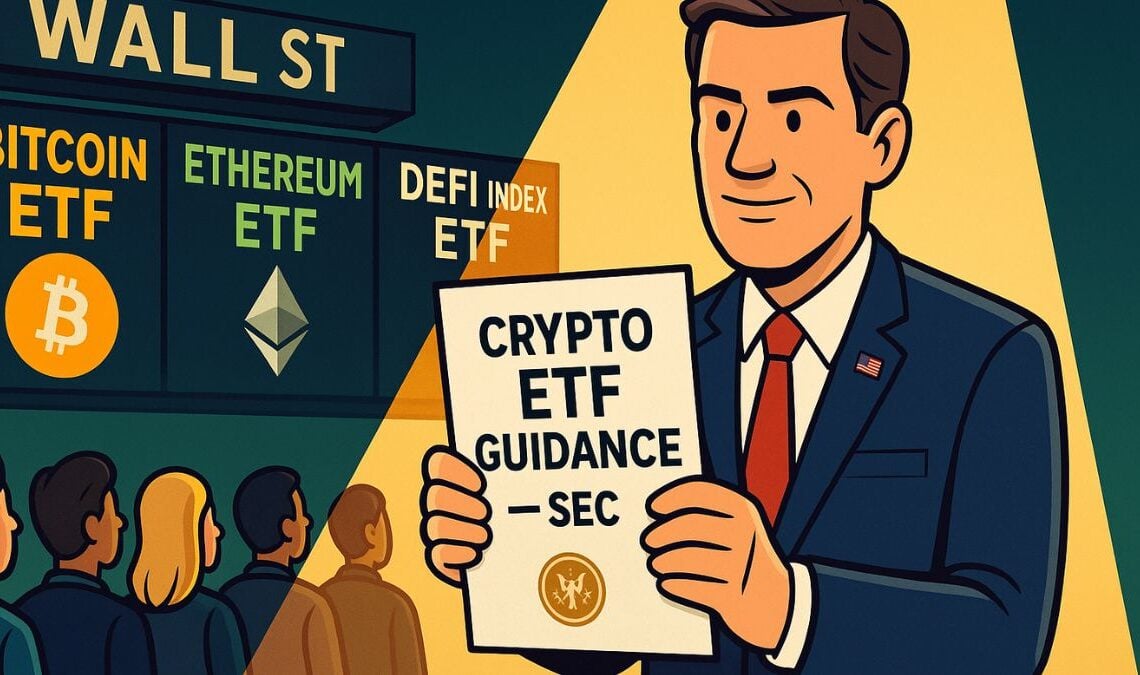The U.S. Securities and Exchange Commission (SEC) has issued a new set of guidelines aimed at regulating crypto ETFs, marking a significant shift in how digital asset funds may be treated under federal securities laws. While not yet a full regulatory framework, this move is widely interpreted as a foundational step toward formal oversight of crypto exchange-traded products in the United States.
The guidance, published this week, outlines disclosure expectations and compliance obligations for investment firms planning to offer ETFs that hold crypto or crypto-linked assets. According to the SEC, the aim is to provide clarity around custody, valuation, and risk disclosures, three areas that have long been hurdles for crypto ETF approvals.
With demand for crypto investment vehicles growing, particularly after the success of Bitcoin spot ETFs earlier this year, this announcement signals the SEC’s intent to normalize digital asset products within traditional financial regulation.
Why the SEC’s Guidance Matters Now
After years of hesitation, legal battles, and delayed approvals, the SEC’s willingness to engage with crypto ETFs marks a potential inflection point. Regulators are now responding to mounting institutional pressure and growing retail demand for regulated access to cryptocurrencies through familiar financial instruments.
In particular, the new guidance addresses several longstanding concerns:
- Valuation consistency for volatile digital assets
- Market manipulation risk and surveillance mechanisms
- Custodial standards, especially in cases of hybrid custody (self-custody vs. third-party)
- Enhanced disclosure requirements for investors
This structured approach is being welcomed by major ETF issuers such as BlackRock, Fidelity, and Grayscale, who have been lobbying for a predictable path to bring crypto funds to market.
Industry Response to the SEC’s Crypto ETF Stance
Market participants see this development as a major breakthrough not just for Bitcoin and Ethereum ETFs, but also for multi-asset crypto funds, DeFi index products, and tokenized ETF hybrids.
Hester Peirce, the SEC Commissioner known for her pro-crypto stance, noted that while the document “doesn’t solve every regulatory gap,” it demonstrates that crypto ETFs are now part of the SEC’s long-term policy agenda.
On Wall Street, the move is seen as reducing regulatory uncertainty. Firms like Invesco and VanEck have already expressed renewed interest in submitting broader crypto ETF proposals, citing the new guidance as a positive catalyst.
What Could Happen Next for Crypto ETFs
Although the SEC hasn’t yet proposed formal rulemaking, the industry is interpreting this as the first step toward a dedicated regulatory framework for crypto ETFs. The next logical move could involve:
- Public comment periods
- Classification of digital assets under securities laws
- A roadmap for spot ETFs beyond Bitcoin and Ethereum
- Potential guidance for yield-bearing DeFi assets or staking products in ETF structures
This timeline could accelerate, especially if Congress moves forward with digital asset legislation that codifies crypto’s treatment across agencies.
Implications for Investors and the Market
For crypto investors, regulated ETFs offer exposure to volatile assets without the need to manage private keys, wallets, or tax complexity. A broader rollout of ETFs tied to crypto could:
- Increase institutional adoption, especially via retirement accounts and pension funds
- Reduce barriers to entry for retail investors seeking regulated exposure
- Strengthen price discovery and transparency through audited fund structures
- Encourage mainstream financial firms to expand their crypto offerings
At the same time, tighter regulation may limit riskier products or leveraged strategies, but this could enhance long-term legitimacy.
Final Thoughts: SEC Guidance Paves the Way to Regulating Crypto ETFs
The SEC’s new guidance may not be a complete rulebook, but it clearly shows that regulating crypto ETFs is no longer a theoretical discussion it’s happening. For the first time, the Commission is putting crypto-based financial products on a regulatory track, setting expectations and inviting the industry to engage.
With institutional interest rising and investor appetite still strong, the SEC’s step toward crypto ETF regulation could prove to be one of the most consequential policy shifts in digital asset history.










